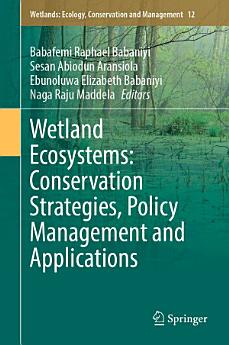Wetland Ecosystems: Conservation Strategies, Policy Management and Applications
About this ebook
About the author
Babafemi Raphael Babaniyi is a distinguished academic and researcher in Environmental Chemistry. He earned a Bachelor's degree in Industrial Chemistry from Caritas University, Nigeria (2008), followed by a Master's in Environmental Chemistry from the Federal University of Technology, Akure (2021), where he is currently pursuing a Ph.D. His research focuses on Environmental Chemistry, Chemical Biology, Bioremediation, Environmental Impact Assessment, and Biodegradable Plastics. With over 40 publications, including book chapters and internationally recognized articles, he has made significant contributions to scientific discourse. As an Assistant Chief Research Officer at the National Biotechnology Research and Development Agency, he actively advances biotechnology, further solidifying his role as a leading figure in environmental research.
Sesan Abiodun Aransiola holds a Ph.D. in Environmental Microbiology from the Federal University of Technology, Minna, Nigeria, where he also earned his B.Tech (2009) and M.Tech (2014). His research focuses on phytoremediation, vermicomposting, biosorption, and bioremediation of contaminated soils. He has expertise in vermitechnology, utilizing vermicasts to aid in heavy metal remediation. Currently a Lecturer at the University of Abuja, he has over 70 high-impact publications, including book chapters and scientific articles. He has co-edited notable books on microbial biotechnology, enzymology, and soil regeneration. Previously, he served as an Assistant Chief Scientific Officer at the Bioresources Development Centre, working on bio-fertilizer applications for soil reclamation. He is a member of the Nigerian Society for Microbiology and the American Society for Microbiology.
Ebunoluwa Elizabeth Babaniyi is an academician and researcher with a strong background in biology and environmental conservation. She earned a B.Sc. in Education (Biology) from Obafemi Awolowo University, Adeyemi College of Education, Ondo, and an NCE in Biology/Geography from the College of Education, Ikere-Ekiti. Her teaching experience includes roles at Best Legacy International High School, Muslim Grammar School, and Best Legacy College of Education, Ogbomoso, where she also engaged in research. Her work focuses on phytoremediation, using wetland plants for eco-friendly pollutant removal, alongside research in microbial ecology and environmental sustainability. She has published extensively and is an active member of the Teachers Registration Council of Nigeria (TRCN). Through her contributions to education, research, and environmental advocacy, she remains committed to fostering knowledge and sustainable practices.
Naga Raju Maddela holds an M.Sc. (1998) and Ph.D. (2012) in Microbiology from Sri Krishnadevaraya University, India, specializing in Environmental Microbiology. His research explores the impact of industrial effluents and insecticides on soil microorganisms and their biological activities. With over two decades of teaching experience, he has held faculty positions since 1998, mentoring undergraduate and postgraduate students. He served as a Prometeo Investigator at Universidad Estatal Amazónica, Ecuador (2013–2015), and received a Postdoctoral Fellowship from Sun Yat-sen University, China (2016–2018), along with funding from the China Postdoctoral Science Foundation (2017) and Universidad Técnica de Manabí (2020). Currently a Full Professor at the Facultad de Ciencias de la Salud, Universidad Técnica de Manabí, Ecuador, he has presented research internationally and has published 70 articles, 12 books, and 40 book chapters.








